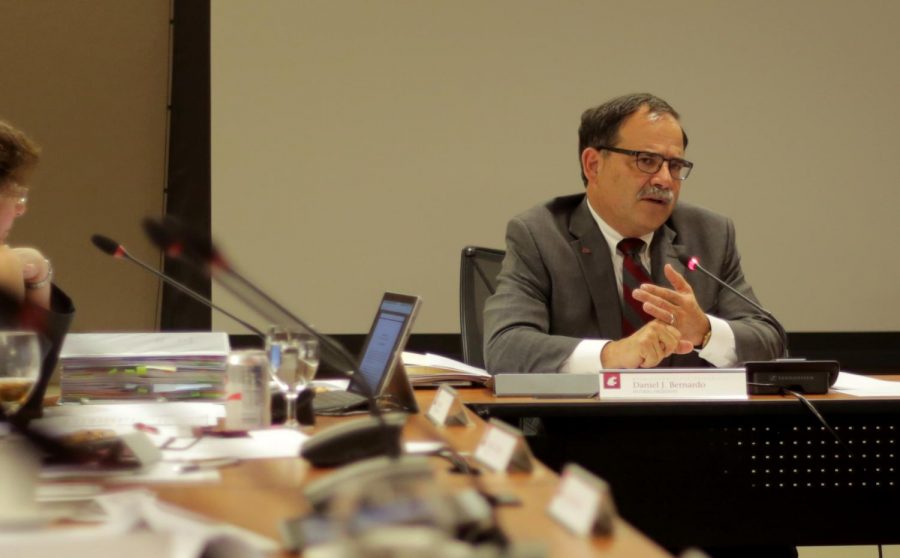Three administrators sued
WSU professor alleges discrimination, invasion of privacy, defamation
ANDREW LANG | Daily Evergreen File
Provost Dan Bernardo suggested a WSU researcher consider an “exit strategy,” according to court documents from a lawsuit she filed against him and two other administrators.
January 29, 2018
A tenured WSU researcher is suing her department chair, college dean and the university provost, saying they discriminated against her, invaded her privacy and retaliated against her for speaking out.
Tracy L. Skaer, a pharmacotherapy researcher at Spokane campus’ College of Pharmacy, is suing John R. White, chair of the pharmacotherapy department; Gary Pollack, dean of the College of Pharmacy; and Dan Bernardo, WSU’s provost.
Skaer filed suit on Aug. 21, 2017 in Spokane County Superior Court. The Board of Regents, WSU’s highest governing body, went into a closed-door executive session on Sept. 21, 2017, to discuss Bernardo, Pollack and White’s request for a legal defense.
Danielle Hess, WSU’s top lawyer appointed by the state Attorney General, wrote the three administrators acted “in good faith and within the scope of employment,” according to executive session documents obtained by the Evergreen. On Sept. 22, 2017, the Board unanimously approved Bernardo, Pollack and White’s request for Hess’ legal defense.
Hess and Bernardo declined to comment. Pollack and White did not respond to request for comment. Skaer also declined to comment.
‘Medically necessary’ accommodations
Skaer requested medical accommodations four times over the course of two and a half years, beginning in late 2013, according to court documents obtained by the Evergreen.
She suffers from incurable and long-term physical illnesses that compromise her immune system and cause her chronic pain and insomnia, according to her healthcare providers’ diagnoses in the court documents. Skaer also has diagnosed mental illnesses that would impact her ability to work.
In early August 2013, she contacted Pollack to notify him of her need for accommodations. Later that month, Pollack submitted a complaint letter to provost Bernardo, saying she was not meeting performance expectations in part because she was missing work.
Skaer’s physician filled out her first request to work from home up to four days a month as needed in October 2013.
White wrote a letter to Bernardo in February 2014, alleging Skaer engaged in plagiarism. A three-person inquiry committee looked into the matter and did not find sufficient evidence supporting White’s claims in the first of multiple investigations looking into accusations of workplace and research misconduct.
Department chairs have the authority to approve work employees can perform off campus, according to the Commute Trip Reduction chapter of WSU’s Business Policies and Procedures Manual.
White did not identify any job duties Skaer could perform from home, according to the court documents.
WSU denied Skaer’s request to work from home up to four days a month in March 2014.
WSU later approved a request for medical leave between July and September. Upon her return, Skaer submitted paperwork from her physician and her psychiatrist saying it was “medically necessary” for her to work from home up to two days a week. In October 2014, Skaer formally requested accommodations for the second time. WSU denied that request in January of 2015.
In her third request, Skaer and her physician provided examples of the work she could complete at home, such as meeting with students and coworkers via online communication, writing grant and research proposals and grading students’ work.
‘Exit Strategy’
In June 2014, Bernardo informed Skaer of a second investigation based on Pollack’s complaints of her work absences.
According to court documents, WSU had given Skaer’s medical records to the faculty investigator without her consent. Within WSU’s Business Policies and Procedures Manual Chapter 90.07, supervisors and administrators cannot access an employee’s medical files without permission unless otherwise allowed by law.
In the court documents, Skaer alleges the investigation was conducted because of her disability and request for accommodations. In December 2014, the investigator found the request for accommodations unreasonable and in excess of what was requested by her medical provider. In addition, the investigator also reported Skaer misrepresented honors she had received at her doctoral graduations.
In February of 2015, Bernardo met with Skaer and several times suggested she consider an “exit strategy,” according to court documents. A month later, Bernardo wrote a letter based on the investigation reprimanding her for using medical leave without prior approval. He also wrote Skaer should report unscheduled work absences due to her illnesses no later than 10 a.m. on the same day.
Following her third request for accommodations, Pollack sent a memorandum to Skaer reprimanding her for complaining of WSU’s release of medical records without her consent and placed the memo in her personnel file.
WSU denied her third request for accommodations in the following month. Skaer again requested to work from home two days per week as needed in January 2016.
In March 2016, White called her level of productivity unsatisfactory in an annual performance review, according to court documents.
In April 2016, 30 months after Skaer initially asked for medical accommodations, WSU granted her request to work from home up to two days a week.
Two months later, Bernardo told her of another investigation looking into whether Skaer failed to request the use of offered accommodations. According to court documents, the investigation did not substantively address Skaer’s complaints of being denied accommodations three times, but did conclude she was not meeting performance expectations during the time period.
Altogether, Skaer is suing Bernardo, Pollack and White for discrimination, saying the administrators targeted and harassed her because of her disabilities and resulting job performance. She is also suing them for retaliation, infliction of emotional distress and violation of WSU Personnel Policies.
Since filing suit in August of 2017, Skaer has opted for a 12-person jury to rule on the case rather than a judge. No trial date has been set.
[pdf-embedder url=”https://dailyevergreen.com/wp-content/uploads/2018/01/Sept-21-17-397-Regents-no-redactions.pdf” title=”Sept 21 17-397 Regents no redactions”]
[pdf-embedder url=”https://dailyevergreen.com/wp-content/uploads/2018/01/20180129112003841.pdf”]
















